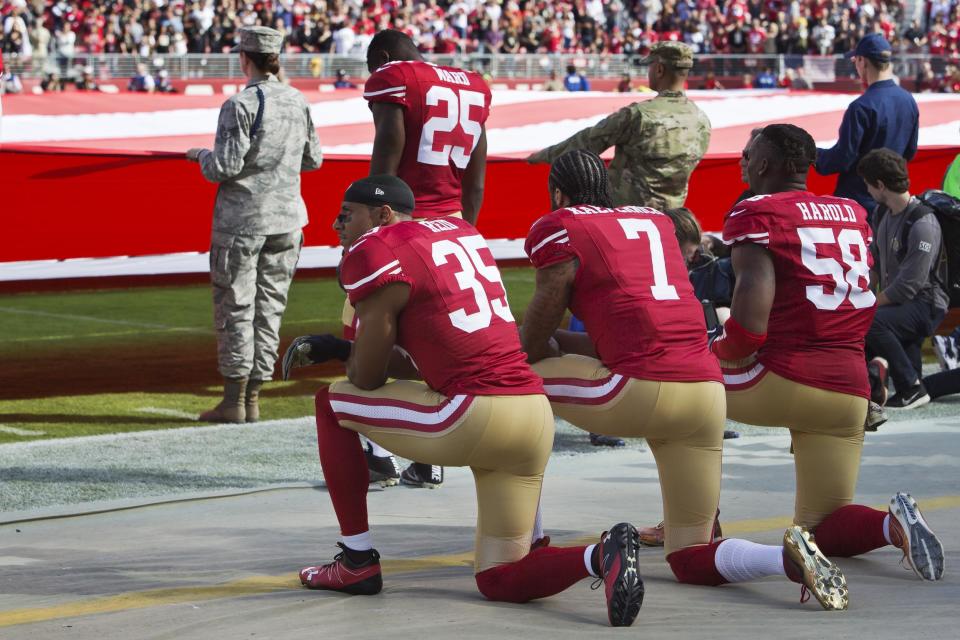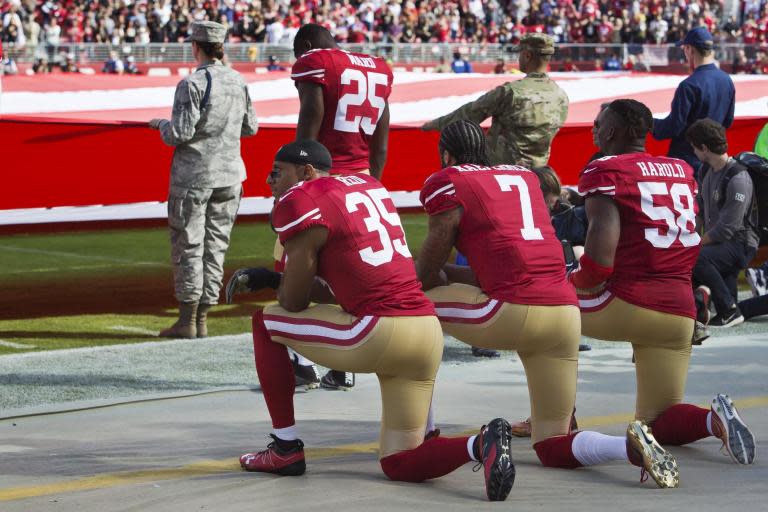Taking a knee: Why are NFL players protesting and when did they start to kneel?
After a wave of players joined in on American football player Colin Kaepernick’s protest movement against police brutality last year — morphing the protest into something of direct resistance to Donald Trump after the president weighed in on the issue — the NFL has now announced that teams will be fined if players take a knee during the national anthem.
The contentious move to take a knee during the national anthem before a game, or stand with arms locked in silent protest, follows in a long tradition of sports stars standing up for what they believe to be right — but some charge that it is unpatriotic and that politics should be kept out of sports.
Here’s what you need to know.
When did this all start?
Kaepernick’s protest first occurred 21 months ago, but was not immediately noticed. At that point, he simply sat on the benches during the US national anthem during a preseason game, just next to some giant Gatorade jugs.
But, he later transitioned to taking a knee in protest — saying he was doing so to show more respect for military veterans — which turned out to be a much more iconic pose. Several other players joined his protest, even though they received a lot of criticism from football fans who said that it was disrespectful to the United States. Still, the movement did not gain huge traction that year.
"I am not going to stand up to show pride in a flag for a country that oppresses black people, and people of colour," Kaepernick said in a press conference after first sitting out during the anthem. "To me, this is bigger than football, and it would be selfish on my part to look the other way. There are bodies in the street, and people getting paid leave, and getting away with murder."
What was the context surrounding those first protests?
Police brutality has become an incredibly polarising and contentious issue in American life. This has come as a result of repeated videos showing police shooting and killing unarmed black men, which have been posted online and gone viral — illustrating the brutality that black people in America must contend with when dealing with some police officers, who often do not serve any prison time for pulling the trigger.
Why is it gaining steam now?
Mr Trump became a catalyst for the protest in September when he said during a campaign rally in Alabama that he wished that NFL players would be fired for kneeling during the national anthem.
“Wouldn't you love to see one of these NFL owners, when somebody disrespects our flag, to say, 'Get that son of a b**** off the field right now, out, he's fired. He's fired,'” Mr Trump said. “You know, some owner is going to do that. He's going to say, 'That guy that disrespects our flag, he's fired.' And that owner, they don't know it [but] they'll be the most popular person in this country.”
Who is protesting?
Some football teams chose not to come out onto the field at all after Mr Trump’s comments, while other teams allowed their players to protest at their own discretion. In addition to most, if not all, of the NFL teams seeing some players protesting the weekend after Mr Trump's September remarks, baseball professionals and basketball professionals also joined in.
Notably, Patriots quarterback Tom Brady called Mr Trump’s comments “divisive”, and locked arms with his teammates during his game following the president's remarks. Brady has remained mostly silent about Mr Trump, whom he has called a friend in the past.
http://players.brightcove.net/624246174001/default_default/index.html?videoId=5587668078001
Donald Trump says NFL kneeling row " has nothing to do with race"
Why exactly is this such a big deal for people?
Mr Trump charges that kneeling during the national anthem is disrespectful to American servicemen and women, as do many of his supporters. The White House has repeatedly attempted to rebrand the protest as a protest of the American flag instead of against police brutality and racism in the US.
After Kaepernick first started the protest, he was criticised for introducing politics into sports. Many said that football was somehow sacrosanct, and that it should be a place where people can rise above politics.
But is it abnormal for sports stars to make their political opinions known during events?
No, not really. There’s a pretty rich history of American sports stars wading into the political sphere.
For instance, John Carlos and Tommie Smith made headlines across the world when they raised the black power salute on the podium after winning in the 1968 Olympics. That protest brought them death threats, and they were expelled from the games.
Muhammad Ali is perhaps one of the best known American athletes to take a major political stand. While not a direct stand against racism, Ali refused to be drafted into the Vietnam War — a refusal that involved jail time. He did so on the basis of his faith, he said, but did note the cruel irony of asking black men to fight in Vietnam for a country that has treated them as subhuman.
More recently, NBA players like LeBron James, Kobe Bryant, and others, helped the Black Lives Matter movement pick up steam by wearing supportive shirts following the death of Eric Garner, who was choked to death in New York.
What is the new NFL rule?
NFL owners unanimously approved the new national anthem policy this week, requiring players to stand if they are on the field during the performance of the song. Players have the option to remain in the locker room during the anthem if they prefer.
If a player or other employee of a team kneels or sits during the anthem, the teams themselves are fined. The teams then have the option to fine the individual players or personnel for the infraction.
The vote was unanimous, but the owner of the San Francisco 49ers — the team Kaepernick played for when he started the protest — abstained from the vote.
The rule will be added to the NFLs game operations manual, and therefore will no be subject to collective bargaining. The NFL Players Association has said it will review the policy and "challenge any aspect" of the rule that is violates the collective bargaining agreement between players and their employers.
What has happened to Kaepernick?
Kaepernick is not currently on any NFL team, even though many of his supporters argue that he is good enough to be picked up by a team. He said himself last year that he was ready to play if any team was willing to hire him.
But, while Kaepernick is out of an NFL job, he has remained busy with charity work. That includes a $1m pledge he made to charitable organisations, which has included support for a variety of groups. Kaepernick has largely refused to comment on the most recent NFL protests, and has refrained from responding to Mr Trump's criticism of the protest movement he started as "unpatriotic".

 Yahoo Sport
Yahoo Sport 







































